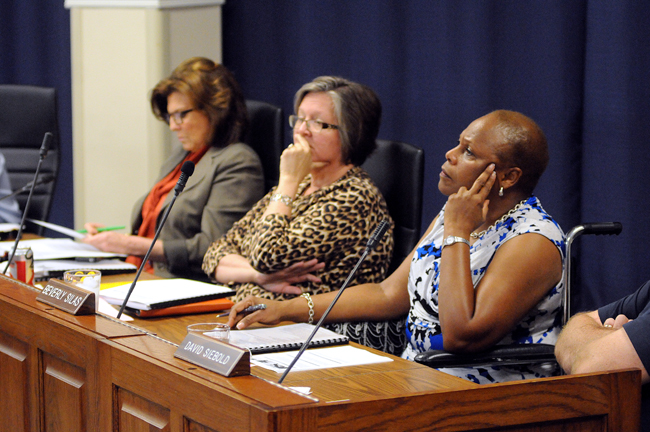The Capital Metro Board of Directors met Monday to discuss a number of issues, including the possible shutting down of two low-ridership shuttle routes that cater mainly to graduate students. According to Capital Metro, the University is no longer giving them enough funds to keep these routes running.
The Capital Metro board had a chance to keep the Wickersham Lane and Cameron Road shuttle routes, the routes in question, open, but after hearing testimony from a few key players in the debate, it approved their elimination unanimously, 7-0.
The move didn’t come as all that big a surprise to Columbia Mishra, president of the Graduate Student Assembly.
“It was a formality on Cap Metro’s part to approve [the proposal],” Mishra said.
That proposal came about through discussions last year by the UT Shuttle Committee, which included 11 graduate students. According to Parking and Transportation Services Director Bobby Stone, the committee voted 10-1-4 in favor of the changes now to be enacted and against fighting for additional funds to maintain the routes.
Still, the move will have a profound impact on graduate students. In an interview with the Daily Texan editorial board early this month, Mishra pointed out that many graduate students have to look for housing in the areas the routes in question service because of a combination of low salaries and high rents.
Luckily, the pain won’t be felt all at once. While the Wickersham Lane shuttle, which serves several apartment complexes south of Riverside Drive, will be discontinued at the end of this semester, the Cameron Road shuttle will be phased out by the end of next semester. Instead of being given the ax in December, the northernmost shuttle will instead be limited to the apartments along Camino La Costa starting next semester before being canceled completely at the end of the school year.
At the hearing, Capital Metro’s Principal Planner Roberto Gonzalez reiterated the agency’s reasons for accepting the proposal, including low ridership counts and the possibility of rerouting city buses to fill the gaps left by the route cancellations. However, we remain concerned about the accuracy of the data on which so much of this decision was based.
Sociology graduate student Chelsea Smith took the opportunity today to question whether simply counting the number of rides taken in a day was a fair measure of route popularity.
“To me that [measure of ridership] counts rides, so as UT students we’re all paying into this budget, so this number that we’re using is the number of rides that happen [throughout a] day,” Smith said. “If a student living in West Campus takes it to and from campus multiple times a day, that could be, say, six to eight rides, but as graduate students and other students living farther away, we’re only taking the shuttle in once a day … We’re paying the same amount as everybody else, but we’re counting as less.”
In addition to Smith’s concerns, GSA communications director David Villarreal, who was not present at the hearing, has called into question the reliability of numbers obtained by the agency’s automatic counting technology.
“Supposedly, every time a student enters the bus from either the front or the rear, they pass through lasers that count them,” Villarreal said. “However, if you go to any UT shuttle, you will see that the reflectors are only on the front door and not the rear exit. This is important because many students enter and exit … without ever being counted.”
We understand that Capital Metro offered students several chances to speak out against the proposal. We also understand that there were a number of graduate students on the committee that originally put forth this proposal. However, we have to side with Mishra, who told the board that “[students] need more time” and opportunity to participate in the process.
Granted, members of the public were allowed one last chance to weigh in today, but the actual vote was shoehorned into the end of the meeting in a package of measures that included unrelated items of business such as the approval of contracts to implement a customer WiFi system on city buses and to demolish and remove an existing HVAC chiller.
Students deserve better than that. At the very least, they deserve a “public forum on our campus,” as Mishra called for Monday. While some of the changes are slated to be implemented next semester, the damage done Monday is not irreversible. The responsibility now lies with students to look for a funding solution to keep students on the shuttles.





















